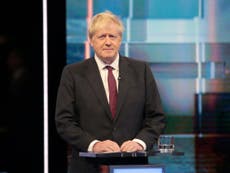Thanks to Boris Johnson and Jeremy Hunt, the magic money tree is back – too bad they won't spend it wisely
If they want to implement tax cuts, the candidates will have to row back on their spending commitments or rely on borrowing, increasing the deficit. With 4 million workers in poverty, are these the promises they should be making?

The “magic money tree” is once again in bloom this summer. During the brief period of last night’s TV debate dedicated to non-Brexit matters, both candidates for prime minister, Boris Johnson and Jeremy Hunt, reiterated their support for corporate and income tax cuts and various spending pledges, marking a decisive break from the austerity agenda. These pledges have already raised a few eyebrows, with voices from across the political spectrum asking where the money will come from – including the (presumably outgoing) chancellor.
It is disconcerting that both candidates have prioritised tax cuts for the wealthiest. Britain already has the lowest rate of corporation tax in the G7, but Hunt would go much further and drag us down to 12.5 per cent. Hunt justifies this by claiming corporate tax cuts have led to much faster growth in the US and would pay for themselves. The evidence, on the other hand, shows that these tax cuts are not responsible for the recent growth spurt.
Meanwhile, Johnson has suffered a hasty backlash after promising to raise the higher-rate income tax threshold from £50,000 to £80,000 in an effort to help the struggling top 10 per cent. With around 4 million workers living in poverty, the NHS struggling through winter, and reports of schools shutting early on Fridays due to budget pressures, should these tax cuts really be the priority for the next PM?
It is positive that fiscal policy is back on the agenda after the stranglehold austerity has placed on debates about tax and spending in the UK. But while some of the pledges from the PM candidates, such as Johnson’s pledge to increase pay for public sector workers, are welcome and long overdue, they do not amount to an end to austerity. Both candidates will have to reckon with the reality that, if they do want to implement their promised tax cuts, they will either have to row back on their current spending commitments or rely on borrowing – which will increase the size of the deficit.
This is not to say that the UK cannot borrow for spending and investment, especially when the cost of borrowing is as low as it has been over the past decade. However, it is neither sustainable nor desirable for the UK to build public services on the back of ever-increasing deficits. This challenge will only intensify in the future as population ageing increases demand for NHS and care services, with fewer workers potentially resulting in continually slower economic growth.
We need to fundamentally shift the UK economy so that the public services we all rely on are suitably financed to meet our demands and expectations. We must take inspiration from Scandinavian countries and other European nations which have combined higher levels of government spending with greater social protection, economic growth and higher living standards.
This is not a pipe dream. The UK maintained higher spending not so long ago, until the financial crisis was used to justify the roll-back of the state. A report we published last week showed that we would only need to increase government spending by four percentage points over the course of the next two Parliaments to achieve parity with our European neighbours.
Through a small, incremental increase we would converge with our European neighbours by 2025 and this would generate an additional £1,660 per head to be spent on key public services, such as education and health.
This would provide much needed investment for vital services and public infrastructure. However, it will not come for free. We estimate that to achieve the desired shift in spending by 2025, the UK will need to raise £119 billion or around 4 per cent more of GDP.
For the next parliament the priority should be raising taxes on the wealthiest to address the UK’s high levels of wealth inequality. However, the higher tax burden cannot exclusively be shouldered by the very wealthy; beyond the next parliament,small tax increases are also likely to be necessary for those on middle incomes. Politicians need to be honest and accept that the delivery of adequate services requires society to be willing to pay a bit more.
Throughout the Conservative leadership campaign we have heard about the crises in care and the NHS. We have heard about the need to give every child a world-class education. We have heard about how we need better public transport, especially in the north of England. Almost every area of public service requires improvement according to this campaign and the simple truth is this requires investment.
There is agreement on this front. The question now is whether we go down the path of tax cuts and rapidly ballooning deficits – or whether we take this opportunity to collectively decide to commit more to invest in the services we all rely on for the sake of a stronger, fairer economy.
Dean Hochlaf is a Researcher at IPPR



Join our commenting forum
Join thought-provoking conversations, follow other Independent readers and see their replies